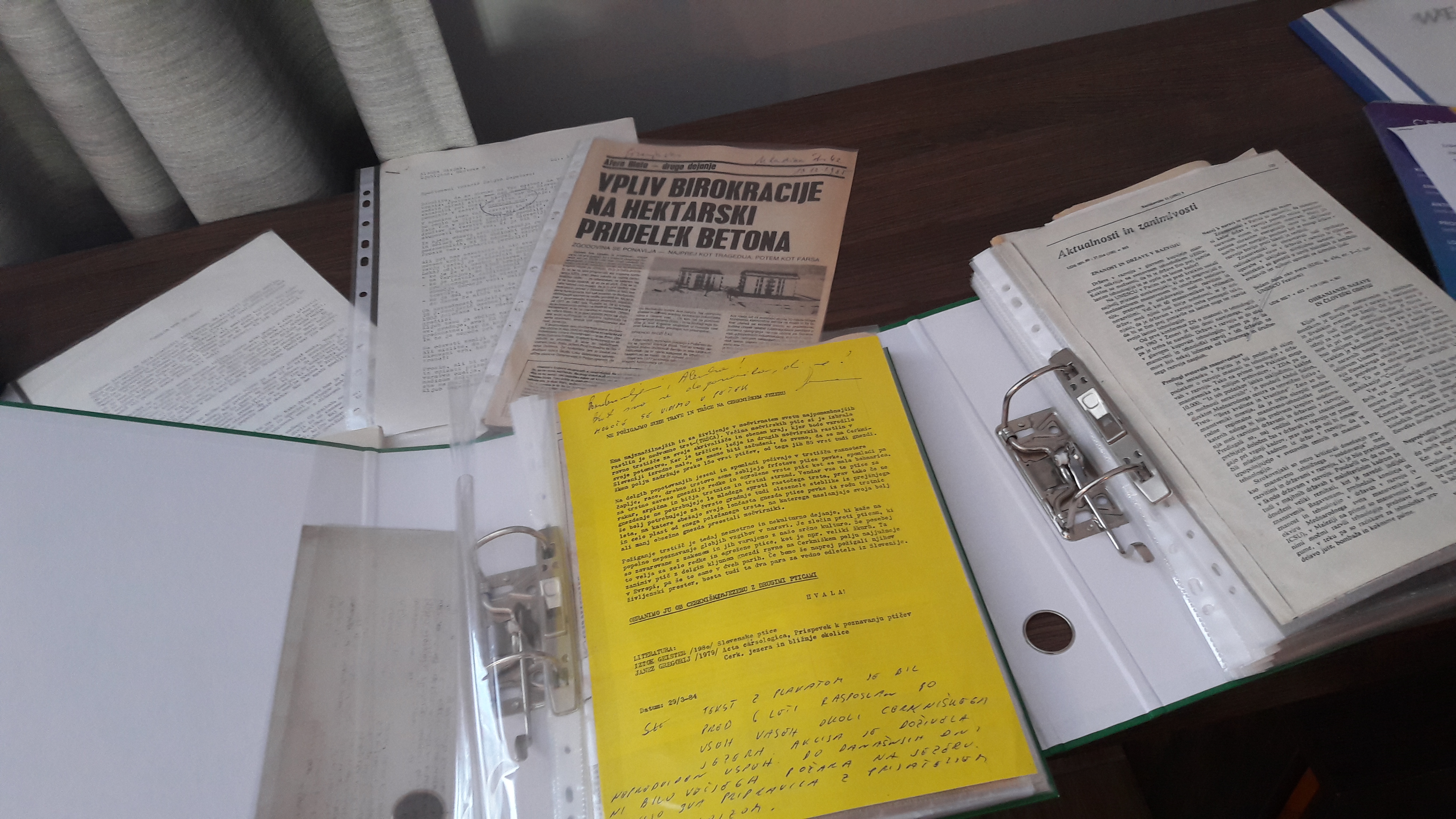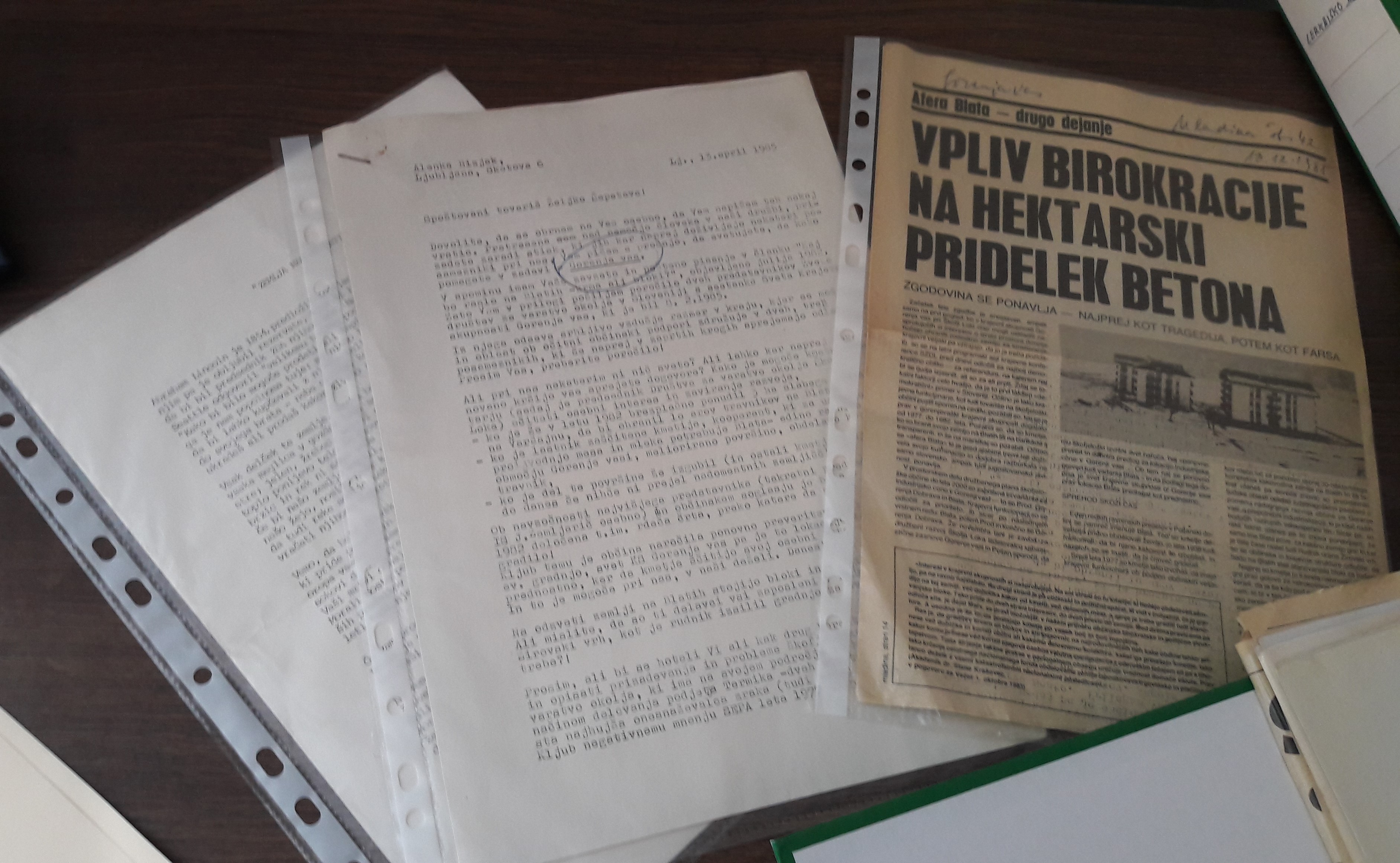The Alenka Bizjak Environmental Collection was created as a result of Bizjak's activism in the period from the 1970s to the 2000s. Bizjak advocated for environmental protection in Slovenia, and her activities had an indirect influence on raising environmental awareness throughout Yugoslavia. The collection consists of letters, draft articles and newspaper clippings.
At the beginning of 2016, due to relocation, Alenka Bizjak decided to give her collection, i.e., the documentation of her activist work, to a researcher who would take care of it and use it in scholarly work. Through a mutual friend, Alenka Puhar, Ms. Bizjak donated the collection to Željko Oset, Ph.D., a scientist and professor at the University of Nova Gorica. The collection was not organized, so Željko Oset arranged it chronologically and thematically. The materials in the collection are primarily related to the activities of Alenka Bizjak concerning the environmental protection of Slovenian rivers. (Oset, interview, July 6, 2017)
According to Željko Oset, the collection is interesting and important because it deals with the activity of civil society that began in the early 1970s. The development of civil society in the domain of environmental protection was part of a European trend at that time (Eastern and Western), and Yugoslavia also created a legal basis for environmental protection. The main difference between the Western and Eastern countries was that in the West a powerful civilian movement grew into a political movement, while in the eastern part of Europe, under one-party systems, that was not possible. The Yugoslav authorities allowed local associations to be organized, and the Association of Societies for Environmental Protection in Slovenia (Slo. Zveza društev za varstvo okolja v Slovenije) was founded in Slovenia. Alenka Bizjak was the secretary of the association and she wrote press releases and prepared materials and articles for publication. She wrote polemic articles for periodicals that did not want to publish them until the 1980s. She also wrote public protests and letters. The activities of environmental activists were ignored through the refusal to publish their texts, until the disaster in Chernobyl in 1986, when panic consumed all of Yugoslavia and when the wider public realized the relevance of the environmental issues.
The content of this collection testifies to the debates about environmental protection that took place in the 1970s and 1980s and in which activists such as Bizjak were labelled "ecofascists," thus trying to discredit and diminish the significance of their arguments. Oset notes that Bizjak's collection shows that people shunned and verbally attacked her, but when environmental activities became popular in 1980s - "they still joined her because they saw some non-political organization in that" (Oset, interview, 6 July 2017).
It is interesting that in 1986, when the nuclear disaster occurred in Chernobyl, the nuclear power plant at Krško began operating in Yugoslavia, and the use of nuclear energy in Yugoslavia was not problematic up until then, the only thing controversial about the construction of the power plant was that it was being built by foreigners and that the country had to incur debt. After the Chernobyl accident, this changed and public debate started, which is evident from the materials in this collection. Previously, opponents of nuclear energy were characterized as enemies of development and those who were in favour were presented as experts. According to Oset: "This is the former dichotomy – experts vs. non-experts. It was believed that those against the use of nuclear energy were at the same time against the development of the country, and thus against Yugoslavia itself. There were no politics present in the debate, it was primarily expert discussion, and the biggest political pressure was not publishing an article in a newspaper or journal. But this is difficult to distinguish - whether it's an editor's decision or a strategy which came from a higher level"(Oset, interview, July 6, 2017).
The Alenka Bizjak Environmental Collection testifies to the culture of dissent in Yugoslavia in the form of civil society activity and its struggle for the affirmation of environmental topics, i.e. raising public and governmental awareness of the importance of environmental protection, which directly opposed the government’s plans for the construction of power plants, such as was the one on Lake Cerknica, where activist protests were successful (Oset, interview, July 6, 2017).
The materials from the collection were first used in a paper by Željko Oset, Ph.D., "Contribution to the History of Environmental Activism during the Communist Era in Slovenia" (Slo.˝Doprinos povijesti ekološkog aktivizma u Sloveniji u komunističkom razdoblju˝), which will be published in the Review of Croatian History.


